When you read what you wrote a few years ago, it seems written by someone else. I recycle it here. I suggest you also click on the original post, since it has added insight from relatives who knew my father longer than I did.
I loved my father and he was loved by many. He served his country in World War II and by working w/o complaining at a dirty and hard job for more than 30 years. He married a good woman and stayed true to her until death parted them, raised a family and gave his children opportunities he never had. My father was a kind man who did his part to make the world better. Almost a quarter century after his death he is still fondly remembered and the values he taught still light the way for his children and grandchildren.
The measure of a successful life is one that has filled a valued place. My father’s life was success.
Click here to read the original post on Facebook.
I thought it might be a good to complete my parent series and rather than wait until father’s day. Unlike my mother’s case, I did know my father as an adult, so I know rather more, but still not much about the early years. We did not have much contact with his side of the family. Both his parents died before I was born. He and his fraternal brother Joe were the youngest. They were born twenty-two years after their oldest sister, Helen.
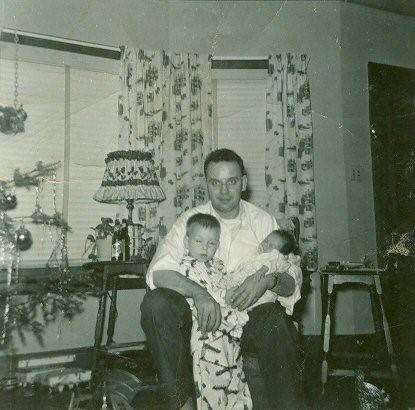
I was named after my father, so I am technically John Matel, Jr. John Matel Senior was born in Duluth, Minnesota. His father, Anton, had come over from Poland around 1900. His mother, Anastasia, was of Polish ancestry too, but she was born in Buffalo, NY. My father never told me much more than that, although I understand that her family was from Galicia in the Carpathian Mountains. They spoke Polish in the home and that was my father’s first language.
I found out later that my grandfather’s family was from what is now eastern Poland: Suwalki and Mazowsze. I learned this from a cousin called Henrik Matel who found me when I was working at the Consulate in Krakow. Henrik’s father was my grandfather’s brother, so Henrik was my father’s generation, not mine. His father & another brother went to France to work in coalmines. My grandfather made a better choice and went to America. Henrik did not know much else. His father died in a train accident when he was only eleven (his father not Henrik :)). His mother remarried and evidently, his was not very fond of her first husband and kept none of his papers. Henrik unwisely returned to Poland after WWII, believing communist promises that things would be good there. Young men make bad choices and believe more in the promise than the practical.
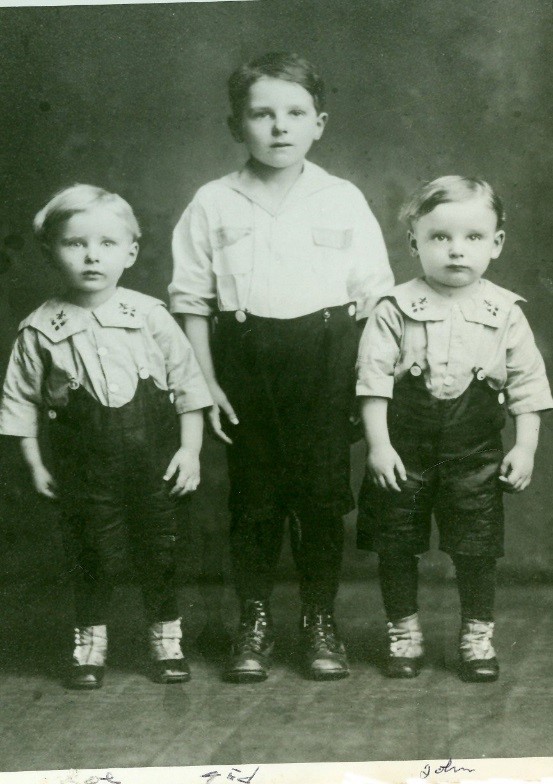
Henrik lamented that the Polish side of the family were a bunch of drunks. Things didn’t change much in America. Now you know as much about my father’s prehistory as I do and I suspect a little more than he did.
My father talked about growing up in the depression. He kept some of the frugal habits from those times. He saved bacon grease to use as butter, for example. And he did not waste food. His childhood home was small and crowded. It was on 4th Street. I went to see it. Things had changed. It was in a gentrified neighborhood and considered a small home for a single couple. My father’s home housed eight. Their toilet was in the basement, which has a dirt floor back then. He told a funny story about his youth. The family went to see “Frankenstein” and it scared my future father. His brothers set up a dummy in the basement and the made it sit up when little Johnny went down to use the toilet. He said he no longer needed to use the toilet.
The freeway has also cut the neighborhood up. My grandparents bought the house because it was only a few blocks their church St Stanislaw. The freeway made it a long walk around a busy street.
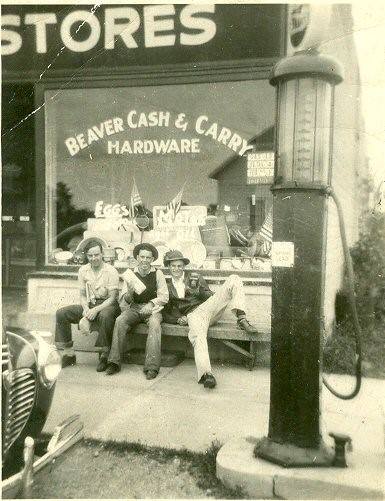
My father got a job with the Civilian Conservation Corps (CCC) and was stationed near Superior, WI, where planted trees and cut trails. It gave him a lasting appreciation for forestry, which he passed to me. How else can you explain a city boy so attracted to the woods? Some of it is myth, or just a feeling, but whenever I look at the groves of trees planted by the CCC I think of him, even when they were not planted by the CCC. They are mature forests now, but in the Dust Bowl years, they were pioneers.
After getting out of the CCC, my father got a job at Medusa Cement, where he stayed for the rest of his life, except for the time he was in the Army Air Corps during World War II. He was drafted into the Army soon after Pearl Harbor. He never told me much about that part of his life. I know he got seven battle stars, so participated in all the big actions of the war in Europe. He was not really have there for all of them. He told me that he remembers nothing at all about Anzio. But where his unit’s planes went, he officially went too. He landed at Normandy a few days after D-day. The only time he actually got near fighting Germans was during the Battle of the Bulge, closer than he wanted. He got a Purple Heart, which indicates some proximity. He did not go into details, except to claim he was drunk and could not recall.
They had a point system for discharge from the military as the war wound down. My father had a lot of points because of those battle stars & Purple Heart mentioned above, so he was among the first U.S. soldiers discharged and one of the first home He always expressed a special fondness for Chicago, the city of his discharge. Since victory in Europe was still such a fresh memory, people were eager to welcome him home and buy him drinks. It is a once in a lifetime experience and not everyone gets anything like it in his lifetime.
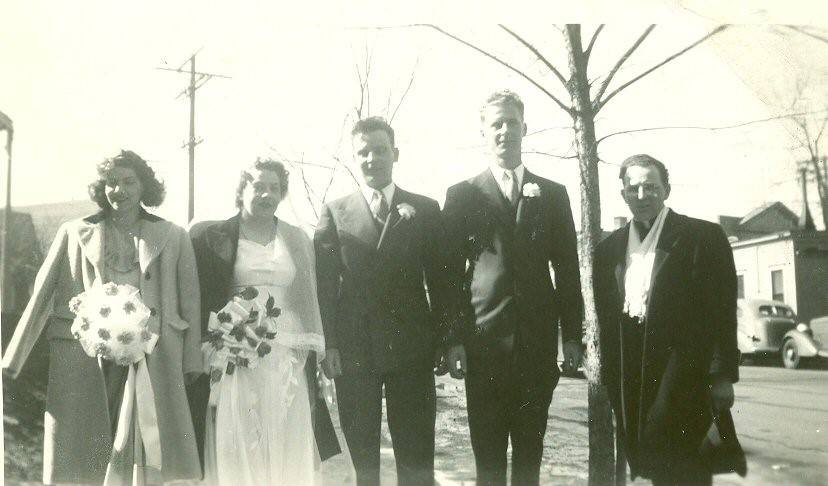
My father went back to work at Medusa Cement and married my mother in 1946.
Our house in Milwaukee was full of artifacts of my father’s work. He did a lot of work on the house, but never got very good at it. He and my maternal grandfather built the boiler, constructed the steps in the back and built the retaining wall by the alley, for example. All these things worked for the purpose intended, but they were odd and off balance. The boiler threw most of the heat out through the sides. That meant that the basement was very warm – the rest of the house not so much. (On cold days could freeze water by the wall. I know. I did it.) The steps were all unevenly spaced and lopsidedly leveled. The wall leaned artistically and improbably in both directions with drainage holes made from beer cans cut out on both ends. The evident surplus of beer cans explained much of wall’s other oddities.
During my childhood, my father worked most of the time. The Interstate highway system was being finished and that meant lots of overtime. The old man put in twelve-hour days all summer and most of the fall. He was worn out when he came home and his main recreation was drinking beer. He drank a lot of beer, at first Schlitz, later Pabst and then Budweiser, but he never missed a day of work because of that, or for any other reason. I don’t remember him ever taking a sick day.
Maybe he just denied sickness because he hated doctors. He went to the doctor only once from the time he got his discharge physical out of the army in 1945 until the time he died more than fifty years later. On that occasion, he had a cyst removed from his stomach. The doctor forgot to sew it up. Forgot. After that, he said that the medical profession had their chance and he was not going to give them another. When the doctors finally got their second look at him, the day he died, they could not believe my sister when she told them that he did not take any medication besides Budweiser.
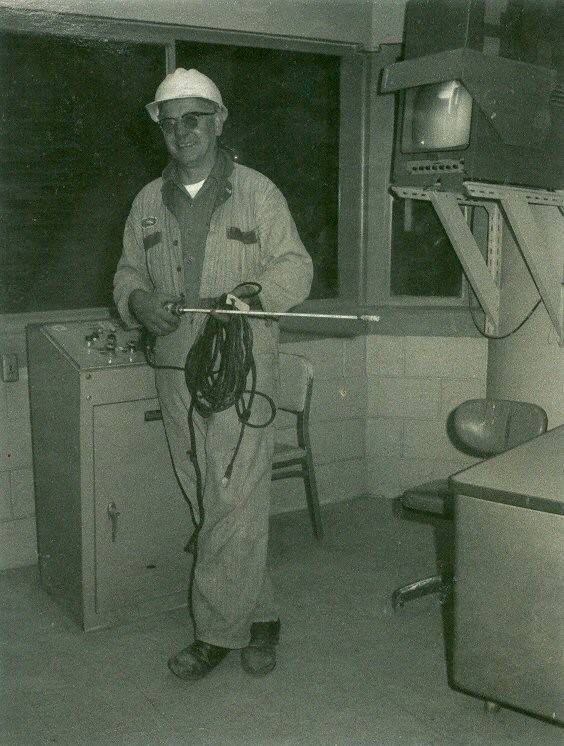
I really didn’t get to know my father until after my mother died in 1972. As I mentioned, he worked all the time and went to bed early. After my mother died, the old man was grieving too, but he tried to make it easier for my sister and me. He tried to cook, but was not very good at it. Nevertheless, my father was nothing if not stubborn. He ate what he cooked and made us eat it too. I recall watching some bread bake in the toaster oven. The old man asked if I thought it was ready. Just at that point, it burst into flames. We still ate it.
Even funnier was the pork chop incident. My aunt Florence instructed the old man to bake some pork chops and then save the bones. It was likely that they were to be used for soup, but I don’t know. Anyway, my father got the instructions wrong the next day and baked the bones again. Supper was a pile of very black pork chop bones and a baked potato. My sister and I laughed and we would not eat the bones, but he old man would not admit a mistake. He stubbornly gnawed on the bones and claimed to like it.
(Funny the little things you remember. My father had the front room. His roof leaked and when there was rain we would often hear him in there “shit. shit. shit.” But we never managed to fix the roof. Or another time my sister and I were watching TV when we heard a thump followed by “shit. shit. shit.” His bed had collapsed and thrown him to the floor. He was probably more upset that we heard it and thought it was so funny.)
My father dropped out of HS in the tenth grade, claimed that he could not see the blackboard and his family could not afford glasses. But he respected education and made sure my sister and I went to college. To help me with money in college, he helped me get a job at the Medusa cement company, where I got to work those twelve-hour overtime shifts and make the big bucks. Most of the time I loaded cement bags onto pallets. It was a very hard, boring and dirty job and I hated it. The bags weighed as much as 94lbs. Everything hurt at the end of every day. But at one point, the boss assigned me to hopper cars, i.e. railroad cars full of cement. I worked from noon to midnight, which was great. I could sleep late and then meet my friends at the bars at midnight. At the job, I got to lift very heavy tools and smack things with sledge hammers (something young men like) but in between the hard work I got time to just hang around by the river and wait for the cars to empty (something else young men like). Then I got to ride the empty railroad cars to the end of the dock, applying the brakes and jumping off just before the rammed into the car in front.
I told my father that I thought this job was fun; maybe I could take a semester off school and make a little extra money. The next day, he made sure the boss gave me the midnight till noon shift, which did not suit me at all. There was not much time to go out drinking with my friends and staying up all night was hard. The old man explained that the worst thing a young man could get was a job he liked that did not have a future. He promised make sure that I would never like the job too much until I graduated college. He wanted me dislike work enough that I would stay in school in expectation of something better. I did. Thanks Dad.
I also worked hopper cars during Christmas break, BTW, but it was less fun. I remember working at night and looking at the temperature on the Allen Bradley clock tower. It always seemed to be five below zero. I would work as fast as I could out there by the tracks, get the cement moving and then rush into my father’s work-space and sit in front of the heater. My co-worker, LC (Slim) Duckworth, used to sleep in front of his own propane heater very close. He was used to it. I could not stand it because it let out terrible fumes that made me dizzy. Slim had no complaints until he started his pants on fire from sitting too close for too long. We put him out w/o any lasting damage, but he never sat near that heater again. LC was the strongest man I knew, but his ability to sleep almost any time was his most remarkable skill. He could sleep standing up. I learned much of his technique, but never achieved his true master sleeper status.
My father retired when he was only fifty-six. He already had thirty-six years in, since he got credit for his time in army. I can understand why he wanted to quit. The job was noisy, dusty and hard. Nevertheless, the plus side is that he had many friends at work. His job involved loading trucks from the silos above. He ran machines that did it. While he had to stand much of the day, it was not otherwise physically very hard. He had long since graduated from loading bags and unloading hopper cars. He knew all the truck drivers.
It was fun to watch the interactions. You had to learn to understand the “arguments”. All blue collar workplaces would be called “hostile” by today’s standards but it was more fun and you learned lots of uses for the F-word. If you just listened to the words, you would think they hated each other. They were always swearing at each other, calling each other names and making jokes about each other’s’ characteristics. But you soon noticed that the worst insults were reserved for the guys they liked the most. There was often the argument where my father called one of the guys a dumb Pollack, the guy answered back calling my father a stupid Pollack and a third guy telling them they were both right.
Early retirement was a bit of a mistake, IMO. I suppose he thought it was worth it. At first, I think it was. He had time to read and relax. It deteriorated after that. Retirement can be a dangerous profession.
We drifted apart as parents and children often do, when I moved away. In the FS, you are FAR away. My father had a blind spot when it came to my career. When I told him that I planned to take the FS test, he told me not to waste my time. He said that such careers were “only for rich kids” and that I could never get a job like that. Had I taken his advice, it would have been true. You can’t get what you do not try to get. I cannot blame him. It was just farther than he could see. He was just projecting his experiences.
I didn’t make it back in time when the old man died. My sister called me and I got on the next flight from Poland. But the next flight was the next day and then I got stranded in Cincinnati. When I called to tell my sister that I would be late, my cousin Luke answered and told me that my sister was at the hospital and my father had died. I figure he died as I flew over Canada. I remember looking down at the savage beauty, the forest and the frozen lakes and thinking it was over. I do not know if I REALLY thought that or if I have just created this memory ex-post-facto. The mind works like that.
My father never made much money but, after my mother died, he spent even less. He never owned a car, never went anywhere for vacation, didn’t waste money on clothes and ate nothing but bean soup, cabbage soup and kielbasa that he made himself. He used to talk about his stash of “cold cash.” We did not think much of it. But when my sister was cleaning out the freezer, she found around $20,000.00 in $100 dollar bills, wrapped in foil like hamburger. The old man hated banks and did not want to have any money that would earn interest that he would have to pay taxes. When dealing with old depression era people, it was a good idea to look around and do not hire stranger to clean up those nooks and crannies. I wonder if subsequent occupants have found money around the house in places we didn’t see.
According to what my sister told me, my father fell down and couldn’t get up. When asked how he was, his last words were, “I can’t complain.” He used that phrase a lot and it was not surprising he would fall back on it, but it seems an appropriate thing to say at the end.
I still miss him. I hope my kids will be as lucky as I was. I can’t complain.
